Abstract
In the wake of the ecological crisis marked by climate change and the loss of biodiversity, the need to reassess the starting points of the economy has become apparent. The dominant economic paradigm has been challenged in many ways and by many actors. A narrative perspective on the economy, which is under review in this paper, broadens the understanding of the economic debate in society, and through this perspective, it also diversifies the possibilities for foresight and social transformation and challenges dominant values, ideologies, and imaginaries.
In human and social sciences, narratives have been widely studied since the 1980s, but the application of the narrative approach to economic thinking has been limited. However, it is justified and necessary because economists play today a very dominant role in the public debate on all kinds of issues.
The concept of narrative is multi-dimensional and multi-interpretive. It can mean slightly different things in different texts. In this paper the term narrative is used in a wide sense to refer to some kind of worldview or thought pattern – however, a distinction is made between an everyday story and an interpretative narrative, and between a narrative and a deep narrative.
In order to change narratives and renew or at least partially reshape the economy a lot of unlearning must happen. This is demanding because, in addition to unsustainable lifestyles, our economic models and production systems, which are fueling the environmental crisis, are deeply embedded in our culture.
Some tools for narrative change are also presented in this paper. They include strategic communications and group work methods like Causal Layered Analysis (CLA) method, which was originally developed by futurologist Sohail Inayatullah.
1. Introduction
The prevailing mindset in our society is that economic growth, success, and prosperity are closely intertwined. Around this is built the mainstream narrative of economic discourse in modern societies. However, it has come under criticism: the paradigm of economic growth is most likely unsustainable for the carrying capacity of the planet.
The very basis of current economic thinking has begun to be questioned, even to the extent of calling for a paradigm shift. While there have been and still are other fundamental disagreements within economics – for example, over whether economic thinking can be based on the assumption of an individual maximising only his or her self-interest, or even over how to measure economic success – the possibility or impossibility of infinite economic growth is perhaps the most profound point of contention. Because the idea of growth has been so embedded in economic thought, to change it means to alter the very foundations of the economy. How the economy might work in the future, what it means, what it aims to achieve, how it is measured – all this is being reassessed in the context of the ecocrisis. There are many efforts to build a new economic paradigm or narrative.
A narrative perspective on the economy can also bring more options, perspectives and depth to societal economic debate and foresight. For example, typical reports on economic trends tend to focus more on the functioning and structure of the economy. Narratives and deep underlying assumptions that drive the economy are then hidden (Gullichsen & Hellström 2023.) These reports fail to recognise the changing narratives as trends, often missing something that is particularly relevant for foresight. Indeed, the narratives we rely on to tell our stories about the world around us reveal how we understand our own reality and on which basis we make plans, decisions and judgements about the future. Narrative foresight theorists Ivana Milojevic and Sohail Inayatullah (2015) have summarised the issue as follows:
We make our own destinies and our own futures by our choice of narratives. And when the world turns, it is narrative that helps us make sense of this changing shift.
Ivana Milojevic and Sohail Inayatullah (2015)
In the wake of the ecocrisis, economic activity has increasingly prompted environmental and ethical reflection. Environmental crisis has also put many views that have dominated economic thinking under serious scrutiny. The contradictions of economic activity in this respect have gradually forced us to look at the economy with new eyes and to talk about the economy in new ways.
2. The narrative approach
In human and social sciences, narratives have been widely studied since the 1980s (see e.g. Riessman 2008), but the application of the narrative approach to economic thinking in particular has been limited and sparse. However, recently there has been some signs that awareness is growing also within the economics profession of the important role narratives play in the economy. (Roos & Reccius 2023.)
One reason why the narrative approach to economics is justified and necessary is the fact that economists play a very dominant role in the public debate on all kinds of issues, and they often influence what kind of narratives are used in that debate. In the building phase of the welfare state, sociologists played a similar role, at least to some extent, but now, for quite some time, economists have been at the centre of the public debate influencing policy orientations. Moreover, mainstream economics has emerged as a relatively closed discipline in the sense that its publications make little reference to the findings of other social sciences, and within economics there is also less methodological diversity than in other social sciences (Eskelinen & Jonker-Hoffrén 2017; Fourcade, Ollion & Algan 2015). This perceived relative closedness also calls us to examine mainstream economic thinking from a broader narrative perspective.
The use of narratives is associated with choices and with it the exercise of power. The more important the social choices and decisions, the greater the social power involved. Social decisions are often those whose effects are felt over a long period of time. Therefore, decisions should always be assessed not only from the perspective of the present, but also from the perspective of the future and future generations. Prevailing social discourses and interpretative frameworks, narratives, are important because they are the basis for the exercise of power to construct the future, both the power to decide about the things that concretely shape the future and the power to determine future prospects, scenarios, visions et cetera, i.e. the power to define futures, power to influence what is considered possible or desirable in the future (see Dufva et al. 2024). Furthermore, narratives influence the interpretation of things – even the interpretation of individual facts can depend on the narrative that is central in the mind of the interpreter (Jenkins 2018).
In today’s world, the power aspect of the global economy is undeniable. At present, the danger lies in facing the future with an economic narrative that may be misleading and even destructive but is taken as true.
According to many economic analysts, the prevailing economic paradigm is neoliberalism (of course, depending on your point of view, neoliberalism is either a paradigm in itself or just a form or part of an even larger paradigm, capitalism), as the authors of Demos Helsinki’s Turning the tide report (Gronchi et al. 2022) argue. According to that report, the recurrent basic ideas or conceptual and social premises of neoliberalism – which can also be thought of as different levels of narratives – are: economic growth, individualism, small government, private ownership, belief of mind over matter, and of humanity over exploitable nature.
However, these are not the only way to structure the narratives behind our economy. Sixten Korkman (a Finnish economist) for example, does a different structuring in his book “Talous ja humanismi” (Economy and Humanism) (2022). He examines the impact of culture on the economy through four stories, which he also calls narratives. In the book, he explains how these four narratives have shaped the economy as we know it today. These narratives – or their titles – are Christianity, Enlightenment, Market Economy/Capitalism and Humanism. By Christianity, Korkman refers in particular to post-Reformation Christianity, where the virtues are diligence and austerity, which have helped capitalism to flourish. Enlightenment, on the other hand, is linked to economic freedom and to the fact that the pursuit of happiness began to be pursued more in life on earth and not in the afterlife. He also sees the market economy, which has enabled rapid economic growth, as a legacy of the Enlightenment. Humanism is seen by Korkman as a counterforce to the problems created by the market economy (Korkman 2022.)
Regardless of which structuring of the narratives that underpin our economy one prefers, it is important to note that narratives are not static or immutable. They live in time and can change over time. Narratives about the economy are linked in many ways to the prevailing culture. However, the cultural nature of the economy is often overlooked, as one of the features of modern market society is that the economy is seen both as dominant in society and as somehow separate and distinct from the rest of society. For example, there is often talk of ‘economic laws’ that cannot be influenced (Koponen 2017.)
Economic anthropology and economic history have sought to bring a more nuanced approach to Western economic thinking. Among others, the economic historian Karl Polanyi (1886-1964) stressed that the economy is fundamentally culture-bound (see e.g. Machado 2011). Neoclassical economics has even been compared to religion: even the purest economic modelling has been seen to contain moral statements, usually without the modeller being aware of it. For example, economic growth has been said to ultimately aim at secular ‘salvation’, a heavenly kingdom on earth where scarcity is overcome (Mangeloja 2003.)
With the recognition of the culture-bound nature of the economy, the basis falls away from talk of universal and supra-historical economic laws. Economic thought, as we understand it as a Western community, is the product of a single era and a particular social development.
In recent years, there has been a growing critique of the mainstream economic narrative. Critics, such as many degrowth thinkers, have brought into the debate the environmental destruction of the economic system and its largely elite-led benefits. Some of the issues that have come under critical scrutiny in recent years include the following (discussed in more detail in Chapter 3):
- The idea of infinite economic growth
- The role of the state and the public sector
- Measuring economic success
- Values and the valuation of economic activity
- Global responsibility of the economic activity
- Systemic change of the economic model: regenerative economy
- The relationship between man and nature behind the economy
On the concept of narrative
The concept of narrative is multi-dimensional and multi-interpretive. It can mean slightly different things in different texts.
It is not uncommon that one uses the term narrative to refer only to widely disseminated stories or accounts and explanations of things and events (see e.g. Larjavaara 2020). In the present text, however, a distinction is made between an everyday story and an interpretative narrative. However, this distinction is not entirely clear-cut, as all stories can in some sense also be considered narratives, but the same is not true the other way round.
Finnish narratologists write in their book “Kertomuksen vaarat” (Dangers of a story) (Mäkelä et al. 2020) that the concept of narrative does not have a well-established special meaning. However, they note that in social discourse, narrative is usually used to refer to some kind of worldview or thought pattern, and this is the general way they use the term in their book. The same applies to this text, but I still distinguish between narrative and deep narrative. Below I will go through the following concepts: story, narrative and deep narrative. Their working definitions are mainly borrowed from the US-based Narrative Initiative (see Narrative Change: A Working Definition (and Some Related Terms) 2019; Toward New Gravity 2017):
Story and storytelling are usually associated with a single event and its narrative representation. A story also often describes an event or series of events, including characters, conflicts and descriptions. It includes a beginning, middle and end. (Narrative Change: A Working Definition (and Some Related Terms) 2019.)
A narrative, on the other hand, is a collection of explanations (stories) which, taken as a whole, form a common interpretive framework around a phenomenon (e.g. an economy).
Unlike individual stories, narratives have no standard form or structure (…) What tiles are to mosaics, stories are to narratives. The relationship is symbiotic; stories bring narratives to life by making them relatable and accessible, while narratives infuse stories with deeper meaning.
Toward New Gravity 2017, 12.
In addition, a narrative can be seen as more dynamic than a story, as the end of a narrative is usually more open, more changeable (see Webster 2020).
A narrative reflects or is a shared interpretation of how the world works. Narrative change is based on the assumption that reality is socially constructed through narrative and that to change the world we need to focus to the ways in which narratives are formed and changed. Sustainable and effective social change requires narrative change. (Narrative Change: A Working Definition (and Some Related Terms) 2019.)
Deep narratives (or meta-narratives) are the most persistent themes and ideas that have permeated stories over long periods of time. They underpin and frame how we understand our relationship with ourselves, others and the wider world. For example, they influence how we see power – who can use it, how, when and for what purpose. Deep narratives contain what we consider ‘common sense’ or ‘natural’. (Narrative Change: A Working Definition (and Some Related Terms) 2019.)
However, the boundaries between the basic terms described above are porous. The terms overlap and relate to each other. For example:
A killer shark film (Jaws) is the story of an insatiable man-eating shark. All stories about insatiable, man-eating sharks form a narrative that teaches us that sharks are dangerous and treacherous. This narrative, in turn, is linked to a powerful deep narrative about man’s relationship with nature and fear of the unknown. (Narrative Change: A Working Definition (and Some Related Terms) 2019.)
Narratives, change, power, and alternatives
Social change can be described in terms of three spheres of transformation. The inner sphere is, roughly speaking, behaviour and technology, the middle is institutional structures, and the outermost sphere is ideals and worldviews. The most impactful and long-lasting change only occurs when change takes place in the outer sphere. (Lahti & Mero 2020; Sharma 2007; O’Brien & Sygna 2013.) Narratives are interpretations of ideals and worldviews and are therefore of particular interest in the pursuit of long-term and deep systemic change.
Narrative change, however, is slow. Over time, narratives gradually change and take on new forms. However, change can be consciously promoted through a variety of means (see Chapter 3).
In a world of rapid social change, the stories we tell are a powerful tool for influencing public opinion and policy. Properly framed narratives are powerful communication tools. They can change mindsets and shape difficult debates in a positive way. It is essential to note how this way of thinking is increasingly found also in the context of economic discourse. (Narrative Change: Lessons and tools for activists to bring about progressive narrative change, 2023; Framing the Economy 2018.)
Of course, narratives can also be used to maintain the status quo, and can therefore be a barrier to change. Among other things, in the fight for women’s rights, old narratives and stereotypes have slowed down the realisation of equality. For example, women have often been associated with qualities such as kindness, emotionality, and poor decision-making skills, which have, at least in the past, made it difficult for women to become leaders (von Schoultz, Henriksson & Kestilä-Kekkonen 2020). Updating economic thinking for the era of the environmental crisis may also be slowed down by the persistence of old narratives in the debate.
One of the prevailing narratives in economic thinking holds that economic decisions and solutions are context-neutral, neutral, non-ideological and ultimately necessary because the laws of economics apply everywhere. This view has been criticised, for example, by the Finnish economic philosopher Teppo Eskelinen. According to him, what is noteworthy about mainstream economics is that ‘through the constructs of neutral money and markets, it tends to blur out of sight the set of questions of power’ (Eskelinen 2013, 30).
Related to this is the consensus within neoclassical economics on the virtues of a certain kind of economic policy. This means, for example, a consensus on the importance of competition, the superiority of using the market mechanism over, for example, government intervention, the advantage of specialisation, and the importance of efficiency (even over equity). Thus, one type of economic policy is seen as efficient and representing common sense, while other, alternative policies are seen, quite bluntly, as merely harmful and naïve. Underlying this is the view that economists, objectively and without ideology, simply describe the economy and the world. If (and often when) this is combined with a disregard for structural and historical analysis, which means that the economic actors are seen as supposedly equal individuals operating in a kind of cultural vacuum, then the result is a bias in which economics is heavily biased towards maintaining the status quo. Alternative policies that would change the status quo or the foundations of current society in any more radical way are often then branded as naïve fallacies. (Ambler, Earle & Scott 2022.)
At worst, all alternatives are labelled ‘ideological’, bypassing the ideology inherent in the economic thinking that sustains the status quo. An example of this is the recent legislation in the state of Florida that prohibits ‘non-pecuniary’ discretion in the state’s use of money. The idea is that all non-monetary considerations are ideological and should therefore be banned as anti-capitalist. (Pelli 2023; Cicconi et al. 2023.)
The stigma of daydreaming or ideology has thus been applied to many new and alternative economic trends, from feminist economics to degrowth economics.
The lack of alternatives in economic thinking, and the fact that many economic solutions are justified only by the claim that there are no alternatives, is already being criticised by many. Yet mainstream economists still see the alternatives only as ‘challengers’ to be tested in mainstream scientific debates. And the outcome of these debates is not seen as any radical rethinking, but at most some of the ideas of the challengers “might merge into the mainstream in the years to come”. (See Maliranta 2023.)
One fundamental way of enclosing alternative views of economics in their own corner is to demand from these alternatives some kind of formal representation or mathematical model to justify new claims (see e.g. Holappa & Määttänen 2023; Tamminen 2023). Teppo Eskelinen writes on this issue as follows:
While much of the social sciences have, through various linguistic and cultural twists and turns, acknowledged that their aim is not to search for laws of motion according to a mechanical model of the universe, mainstream economics still relies on a more mathematical construction of reality. It is within the framework of such a construction that the search for objective and mechanistic laws of motion in the economy is then conducted, the representation of which is based on the knowledge interest inherent in the natural sciences.
Eskelinen 2013, 26.
Under the guise of the demand for a formal representation, the narrative approach to the economy may also be ignored as it does not easily fold into an equation.
Those who offer alternatives to mainstream economics think differently. They hope that their work could challenge the rigidities and harmful power structures of the mainstream and in doing so bring about fundamental change. They also believe that diversification is important if economics is to regain its status as a relevant social science in an era torn apart by both multiple levels of economic inequality and environmental crisis. (See e.g. Ambler, Earle & Scott 2022.)
The lack of alternatives blurs the imagination of the future. The dominant Western economic thinking has left us oblivious to much of the local economic thinking and economic practices found elsewhere in the world, and this has also tended to blur the vision of alternatives. As the Western world has entered an ecological crisis with its growth economy, post-growth scholars have now turned their attention also to local economic systems that are not necessarily based on profit-seeking and colonial thinking at all, but on the interests of the community as a whole (see e.g. Hossain & Holmes 2023).
3. New or alternative ways to see and appraise economy
There have been many calls for a new approach to the economy, and there are many different approaches from both academia and civil society. In Finland in particular, the welfare economy, the donut economy, the eco-welfare state and the European green transition have been discussed (see Paavo Järvensivu, Jussi Ahokas & Tero Toivanen 2022). Many countries have also sought to incorporate non-mainstream interpretations of the nature of the economy (so-called heterodox economics) into economics education.
One of the new approaches, the regenerative economy approach calls for a completely new way of thinking about the economy, i.e. a paradigm shift, rather than changing the way the economy is measured within the current economic system, for example. This would be a transformative change in the economy, revolutionising both economic practices and structures (cf. the spheres of transformation mentioned in the previous chapter). Such a transformation requires a lot of unlearning and learning a new economic narrative.
New interpretations of the nature and functioning of the economy are controversial and attract much opposition (see e.g. Sundman 2023). Some – but not all – of the issues where cross-currents and new emphases in economic thought are evident are briefly presented below. These examples of the emergence of a new narrative (or narratives) represent debates that question what are considered mainstream truths.
A critique of the idea of infinite economic growth
The emphasis on the necessity of economic growth has long been seen as a major narrative in society, and has also been critically examined for a reasonably long time (see e.g. Schnaiberg 1975; 1980; Lahti 1996; Auvinen, Mangeloja & Sintonen 2011).However, the escalation of environmental problems (climate change, biodiversity crises etc.) has brought even more criticism of economic growth to the fore. As the economy has grown with industrialisation, so have environmental problems.
The response of mainstream economists and politicians has been the concept of ‘green growth’. This means growth that takes place without harming the environment. In this case, economic growth would be decoupled from environmental damage.
However, the proponents of the degrowth economy have attacked the green growth narrative. They have pointed out that ‘green growth’ has turned out to be growth that is based solely on the relative decoupling of a particular environmental handicap from economic growth. They have argued that this is not sufficient – it is not enough, for example, for climate emissions to fall as the economy grows if biodiversity loss keeps on increasing at the same time.
According to degrowth economists, for example Timothée Parrique, true green growth should be absolutely decoupled from all harmful environmental impacts (i.e. the ecological footprint), regardless of where in the world these environmental impacts occur. The pace of such decoupling must also be fast enough not to exceed the ecological tipping points ahead, and it must also be continuous. But since such a sufficient absolute decoupling, i.e. real green growth, has not yet happened anywhere, the mainstream ‘green growth’ narrative is not credible. Moreover, the GDP growth makes it more difficult to reduce emissions and damage to nature than it would be if GDP did not grow. Parrique also points out that today other environmental damage (e.g. biodiversity loss) is more closely linked to GDP growth than climate damage. And this is what makes sufficient absolute decoupling so difficult to achieve. (Parrique 2021; Parrique 2023; Lahti & Mero 2023.)
Parrique has also written about how the 2022 report of the International Panel on Climate Change (IPCC) includes a major shift from advocating green growth to degrowth thinking. The report advocates prioritising human and natural well-being over economic growth. The report calls for economic terms to reduce demand, rather than simply greening supply or production (Parrique 2022).
The decoupling of carbon emissions and GDP growth that has occurred in some rich countries is, according to many scientists, not at all sufficient to keep global warming below one and a half degrees. To reach this target, the decoupling rate would have to increase by an average of ten times the level measured between 2013 and 2019 by 2025 (Vogel & Hickel 2023.)
There are even signs that a consensus is emerging among climate policy researchers and sustainability scientists on a new economic paradigm based on a post-growth world, which is skeptical about the potential of so-called green growth. There is global data showing that the majority of climate policy and sustainability researchers in different disciplines are in favour of some kind of post-growth approach (i.e. they are either anti-growth or growth agnostic) instead of a green growth approach (Koskimäki 2023.) In economics, however, the situation is clearly different. Among economists, support for the post-growth approach is still relatively rare.
Even before the recent rise of post-growth or degrowth economic thinking, there was already a critical view of growth in various disciplines. The 1972 report on the limits of growth (Meadows et al. 1972) is perhaps the most famous example. Around the same time as the publication of that report, the environmental sociological theory of the ‘treadmill of production’ was developed. The treadmill of production theory critically describes how economic growth and environmental change are interlinked. The relentless pursuit of economic growth has led to a continuous expansion of production and capital intensification, which in turn has increased environmental degradation. Advanced economies are stuck in this vicious circle, where prosperity no longer grows but environmental damage does. According to the theory, in a capitalist system, the state must prioritise economic growth over ecological problems in order to maintain a balanced budget and social peace. In an early articulation of the theory, the American sociologist Allan Schnaiberg highlighted how big business, the state and labour are all committed in one way or another to economic growth, and how this ideology of growth has dominated both capitalist and socialist societies throughout the history of the 20th century. Part of this narrative is that growth has been seen, albeit sometimes reluctantly, as the only path. (Schnaiberg 1975, 1980; Lahti 1996; Curran 2017.)
In the business world, too, we see here and there today a new way of responding to changing expectations and constraints in the business environment. This also highlights the contradictions between old business models and a new way of thinking that emphasises the value of nature. A gradual erosion of the dominance of the narrative of infinite growth is taking place as new business principles take hold. As such, not-for-profit business has a long history. New ways of thinking include channeling business profits into various ecological conservation activities and seeing nature as an equal (or even primary) shareholder in the company as people. Such corporate activity seeks to reframe the traditional narrative of capitalism by showing how even profit-making business can work for the planet (see Godelnik 2022; Sahan 2023; Patagonia’s Next Chapter: Earth is Now Our Only Shareholder 2022).
Post-growth views have very recently provoked unusually strong reactions at least in the Finnish public debate (see Hiilamo 2023; Kangasharju 2023). There are signs of a battle between different narratives in the air. This at least indicates that post-growth views have moved from the periphery to the mainstream of economic debate and can no longer be simply ignored or silenced to death.
Rethinking the role of the state
In Western, strict traditional economic thinking, the role of the state and the public sector is kept to a minimum so as not to interfere with the functioning of the free market. In such thinking, the state’s role is, at most, that of a “night watchman”, defending the security of society (army and police). In many countries, however, the state is also seen as having a role in maintaining at least some form of health care and education. Of course, the Nordic welfare state model, with its large public sector and (controversially) high tax rates, has also long been an alternative to the nightwatchman state.
However, the above strict and ‘pure’ demarcation or narrative of the state’s role has also been challenged by other means than defending the Nordic welfare state model with its extensive social services. Some economists, led by the British professor Mariana Mazzucato, have also raised the role of the state to include, for example, the maintenance of the innovation system and even the orientation of innovation. Mission-oriented innovation policy is a particular initiative of Mazzucato’s, which aims to strengthen public-private innovation cooperation to address the major challenges of our time. In a mission economy, the state not only fixes market problems, but also acts as an innovator itself (Järvensivu, Ahokas & Toivanen 2022.) In a mission economy, the state is no longer just a backdrop or night watchman of the economy, but a trendsetter and creator of the economic agenda.
However, there have been criticisms of the mission economy from more traditional economists. In their view, there is a danger that if politicians and civil servants are given great freedom in innovation to direct resources and steer policy based on missions, they will end up choosing economically inefficient solutions due to a lack of competition (Järvensivu, Ahokas & Toivanen 2022.) This criticism is thus strongly based on one of the sub-narratives of traditional economics, namely that free competition leads to the best possible outcome.
A recent study by Demos Helsinki, the OECD’s New Approaches to Economic Challenges unit and the BIOS research unit, as part of the implementation of the Finnish government’s analysis and research plan, also calls for a stronger role for the state. According to the study “Econchange: the state’s changing role in regard to the economy in turbulent times”, climate change and biodiversity loss, geopolitical tensions, an ageing population, and the impact of new technologies require a stronger role for the state in steering the economy. According to the report, this also challenges Finland’s long-term economic policy. (Harjuniemi et al. 2023.)
Rethinking the measurement of economic success
When comparing countries and the success of their economies, the most used measure is gross domestic product, GDP, either in absolute terms or per capita. GDP is thought to be a good measure of economic activity, although its shortcomings in this respect are increasingly seen as problematic, as it excludes, for example, household labour. Thus, GDP does not necessarily indicate clearly how well the economy is performing.
Critics argue that GDP does not tell us how much welfare the economy generates. GDP grows just as much if you build prisons and trenches instead of schools and concert halls, for example. The activity of the economy or its size are different things from what good or bad the economy produces.
However, GDP growth or decline is a staple of mainstream economic news. In practice, it is still the number one measure of the economy. Economic journalists and politicians keep it at the heart of their stories.
However, various other measures have been created alongside and in competition with GDP, starting with gross national happiness. Their underlying narratives often differ from the mainstream narrative.
One possible change in the narrative of economic success relates to whether flows or stocks are measured. GDP is a flow measure, i.e. it is usually calculated as annual accumulation (how much output an economy produces in a year), whereas the economy is entirely dependent on different types of reserves or capital, such as natural capital and human capital. The need to measure different types of capital is related to the new narratives in that in the past, under the old mainstream narrative, the capital side was usually measured only in terms of monetary capital. But, for example, in its latest strategy, the Finnish Commission for Sustainable Development aims to put natural capital and human capital at the heart of economic thinking (Strategy of the National Commission on Sustainable Development 2022–2030, 2022).
Bringing values into the valuation of economic activity
What kind of value does an organisation create or produce? The answers to this question form one of the main pillars of economic narratives.
For example, there is an obvious tension between the prevailing (capitalist) concept of value creation and ideas of degrowth. Traditional value creation is oriented towards economic efficiency, productivity and expansion (and numerical analysis), while degrowth-oriented value creation is oriented towards equality, inclusion and ecological sustainability (Froese, Richter, Hofmann & Lüdeke-Freund 2023.)
The problems of the traditional concept of value creation become apparent in the context of care work, for example. For example, feminist scholars have questioned why caring for people is often less valuable than caring for a machine in contemporary economic thinking. Why, for example, is care and domestic work in the home not counted in GDP? Care work also highlights one of the basic narratives of neoclassical economics, namely that people are rational self-interest seekers who seek to maximise their utility in everything they do – but is this true, for example, of carers or those who choose low-paid care work?
There is also the problem of how rational it is to try to monetise everything in general. Does the clarity of a lake at one’s summer cottage or the sound of birdsong in a nearby forest translate into euros? But on the other hand, if there is no way of calculating or even roughly estimating such euros, how are these things then considered in financial planning?
Remembering global responsibility in economic activity
Economic growth has brought us to high levels of economic activity, but this has also led to a situation where six of the nine planetary boundaries have been transgressed (Richardson et al. 2023). The carrying capacity of the planet has been exceeded or at least is in grave danger to be exceeded. This means that economic activity should either be reduced or made sustainable. However, this does not mean that all economic activity is bad or that all economic activity should be reduced – but neither does it mean that economic activity can continue as before.
In 2022, research published in The Lancet Planetary Health found that nearly three quarters of the ecological destruction that occurred between 1970 and 2017 was caused by rich countries, even though they account for only 16% of the world’s population. The high-income US (27%) and the EU (25%) account for the largest share of material overuse (i.e. use of materials beyond sustainable levels), with China accounting for 15% and low-income countries globally responsible for just 8%. From all this, the researchers conclude that high-income countries (and therefore also Finland) should, in the interests of fairness, reduce their use of natural resources. These countries should reduce their use of natural resources by at least 70% to reach sustainable levels. This is not possible, according to these researchers, if these countries continue to pursue economic growth. They argue that there is no evidence from historical data or even scenario calculations that there is an absolute decoupling of material use and economic growth (Hickel, O’Neill, Fanning & Zoomkawala 2022.)
Global responsibility has also been called for by many researchers from emerging countries. They have highlighted, for example, how global economic inequality is largely a legacy of colonialism in the West, including the slave trade (Amber & Earle & Scott 2022). Colonialist global economic structures and patterns of thought will easily remain embedded in sustainable economic policies unless there is conscious attention to the fair treatment of the global South. Alongside global sustainability thinking, the question of the relationship between Western and emerging economies, the equitable distribution of growth, poverty eradication and self-determination over resources and land use (cf. indigenous peoples) must be addressed separately. The dominant narrative of the Western economic system is built on these grievances and is at odds with the goals of planetary sustainability. The degrowth debate has also been criticised for the fact that a single-minded denial or abandonment of economic growth completely ignores the situation in the Global South, where the precondition for economic growth is set in a different context than in the prosperous Global North (Why Integrating Ecological Reparations Strengthens the Degrowth Movement, 2023; Suppiah 2023; Ramcilovic-Suominen, Kroeger & Dressler 2022; Sand Futures: Post-Growth Alternatives to Excessive Mineral Extraction in the Global South 2023).
A change of paradigm: a regenerative economy
It is often thought that the economy has no real function, that is, it is simply a way or system within which society and its members (people and various organisations and institutions) produce, distribute and consume goods and services. Another way of thinking about it is to see the economy as having a function that is greater than itself, such as the production of profit or welfare. The ecological crisis has also given rise to the idea that the economy can also be given the task of improving the environment. A third way of thinking is to look at the economy and its policies from a new perspective, where the economy is neither a neutral system nor a mere tool for improving something. People have started to talk about a regenerative economy:
A regenerative economy is one that in itself operates in a way that sustains in a wholesome way the health and vitality of nature and human beings. In this narrative the economy is not seen as a means to change or improve anything, but rather as a way of sustaining life – and this way is built into the goals and patterns of economic activity. The object of regeneration is not the economy, but the vitality of nature and people. (Hellström 2023, 12.)
In a regenerative economy, strengthening the vitality of people and nature as a whole is part of the economic model and economic activity. In a regenerative economy, nature is not a resource reservoir that serves humans, but human activity is in an appropriate relationship with the rest of nature so that the whole natural system and its human communities flourish. The regenerative economy is defined as an economy that operates in the service of life and adapts to principles that promote the systemic vitality of all living systems (Hellström 2023).
The main difference between the regenerative economy mindset and other types of economic reform initiatives is that the renewal economy is based on transformative change, i.e. systemic change of the whole economy, while other initiatives might seek to reform a specific aspect of the current system (Sanford 2020).
New narrative about nature challenges basic economic assumptions
The first part of this paper listed the recurring basic ideas or deep narratives that underlie the prevailing economic thinking (and neoliberalism). One of the broadest of these concerned the relationship between man and nature. It is based on a vision of nature to be controlled and exploited.
This narrative has a long history. Already in the biblical account of creation, God calls on the first humans to take control of the land: “Have dominion over the fish of the sea and over the birds of the air and over every living thing that moves upon the earth.” (NRSV)
For a long time, however, man was still seen in the West as part of the all-encompassing order of nature, and nature as the result of God’s planned creation. But after the Middle Ages, with the scientific revolution and the mechanistic world view, man began to be seen as separate from nature, and this view freed him to use nature according to his needs and desires.
The view of man as master of nature has therefore been a strong underlying thread in our mythical economic system. Nature has been a seemingly endless source of resources and raw materials. But now, as the crisis of ecological sustainability has emerged to threaten the future of humanity, our relationship with nature has begun to be seriously reassessed. Recently, at least some researchers from various fields have highlighted how we are living in a period of transition and can no longer think of nature only as an object to be exploited or protected. They say that we need to break away from the two-polar thinking that divides people and nature in order to build a better future in which the economic system is also based on a sustainable ecological foundation. (Haverinen et al. 2021)
A new way of thinking about the relationship between nature and the economy is represented, for example, by Sitra’s efforts to find solutions to the nature gap in the economy. Now, halting the loss of nature is seen as responsible economic management and it is recognised that without nature the economy cannot function. The value of nature is to be made visible and should guide economic decision-making (Buchert et al. 2023.) Of course, differences can be seen in the depth of the new thinking: what is the position of humans (and the economy) in relation to nature, whether nature is merely an object of conservation or whether we and our economy are seamlessly and undisturbed part of nature.
One often hears people say that the economy is in crisis and therefore needs to change. However, the way in which the economic narrative is changing can also be understood as a reflection of how our own relationship with the world around us is in the throes of change. The economic thinking of the industrial age, based on an objectifying and exploitative conception of nature, is now confronted with a conception of nature that emphasises agency and self-worth. The point or problem here is our own relationship with the world and the world view on which our society is based. This is also true of the economy, whose infrastructure reflects the centuries-old concept of man as the ruler of the world. (Sanford 2020.)
4. How to change narratives?
It is not easy to change dominant narratives. They represent normative views. Change requires, among other things, understanding existing power structures, identifying and challenging old assumptions, creating alternatives, describing them and telling a story that supports change (Dufva et al. 2024). Just being aware of the existence and power of narratives is important.
The dominant narrative is often eagerly defended against dissenting views. In the worst case, it becomes a truth that is no longer questioned. Even the economic discourse currently prevailing in society is to some extent blind, because the alternatives to the dominant narrative are downplayed or silenced (Hellström 2022). The presently dominant economy is a story told as truth.
The strongest narratives tend to be dictations of the dominant paradigm or norms, and there is usually a great deal of friction involved in changing them. Most individuals and organisations inherently resist moving to a new paradigm because it requires so much sacrifice of what has felt real, comfortable, and desirable (Sanford & Haggard 2020.) Moreover, the dominant narratives or frames of meaning are those that are repeated in the mainstream media and public discourse – with maybe the exception of small academic or activist debates. In this way, the dominant narratives also persist as those that make “the most sense” to the general public. (Milojević & Inayatullah 2015.)
However, since in the longer term it can be disastrous to cling to an old paradigm or narrative that is demonstrably wrong or harmful, it is also worth looking at ways to influence narrative change.
However, in seeking to change narratives, ethics and accountability must be taken into account. Good intentions in changing a narrative, for example on the economy, can sometimes seem like manipulation from a different perspective. This is the case unless the new alternative narrative is based on facts. It is also the case if a conscious effort is made to construct or extract small, emotionally appealing stories that tell only one side of the story, in order to reinforce a larger but overall ethically skewed narrative. Narratives and stories can therefore also be misused. This is a particular danger, for example, in the pursuit of political power and when companies, organisations or even individuals are building a selling brand. (See Mäkelä et al. 2020.) Recognising narratives and critical thinking, i.e. a kind of narrative literacy (cf. media literacy), is also necessary when looking at economics.
Strategic communication as a tool for change
Narratives are maintained and presented in a communicative and interactive way. A conscious effort can therefore be made to change narratives, for example through strategic communication.
Strategic communication refers to a long-term process of change that addresses public narratives and norms that shape the boundaries of public and political acceptability. It includes interventions i.e. active measures to accelerate narrative change, or strategic storytelling. Ultimately the aim is to bring about systemic or structural change, such as policy and legislative change, because this is where the values and ideals of society, crystallised in narratives, become concrete.
In practice, strategic communications aims to (What is strategic communications? 2023)
- build a lasting visibility in different media,
- designing and implementing interventions to embed new narratives in everyday thinking, interactions and practices in order to bring about change in the unwritten rules of culture, and
- catalyse changes in existing norms and build political will to change written rules such as laws and regulations.
In summary, these means of influence are 1) creating a presence in the media sphere, 2) inserting oneself into everyday culture, and 3) gaining narrative power to build political will to advance a cause.
However, genuine change promotion is not just a gimmick or a mere increase in visibility on the web. Only by understanding the current situation and analysing the prevailing cultural narratives can change be promoted. Creating new narratives also requires extensive background work and cooperation between different audiences. Moreover, making narratives more present and embedded in cultural life also means ensuring communication skills (see, for example, Framing the Economy, 2018; Bringing cohesion to life at community level: Lessons on effective narrative immersion, 2022).
Challenging strong mainstream narratives means questioning their underlying assumptions (Milojević & Inayatullah 2015). For example, if ‘progress’ is seen only in materialistic terms, as an increase in consumption opportunities, it is difficult to challenge the ‘economic growth is always good’ narrative.
One way to help change narratives is therefore to expose the assumptions underlying the dominant narrative – the one that seems natural and self-evident at the moment – and the contradictions that may be inherent in it. This will reveal sources of cognitive dissonance and situations where people experience unpleasant feelings because there are too many contradictions between their thoughts, behaviour and values.
Training and teamwork methods for working with narratives
A variety of teamwork methods can be used to access and change narratives. For example in certain trainings and workshops the so-called Causal Layered Analysis (CLA) method has been successful. The method is developed by futurologist Sohail Inayatullah in the 1990s, and it looks at a phenomenon through four layers. Another alternative is the Iceberg Model of Social Change, which can also be interpreted as part of the CLA method (see Dufva 2018; The Iceberg Model 2020). Both CLA and the Iceberg of Social Change model allow us to reflect on and analyse the narratives underlying different phenomena.
The four layers of the CLA method are 1) the litany, or surface-level description of the phenomenon, 2) the system, or the description of the causes and consequences associated with the phenomenon, 3) the worldview, or the perspective and pattern of thought from which the above system-level description makes logical and sense, and 4) the myth, or the metaphors, cultural archetypes and stories that are experienced rather than known intellectually. (Dufva 2018; see Inayatullah 1998.) Of these layers, the last two can be called narratives – the fourth layer is essentially the deep narrative that is described in the second chapter.
Sohail Inayatullah himself has analysed the global financial crisis of 2008 and the narratives associated with it using the CLA method. This analysis can be found in a book co-edited by him and Ivana Milojević, published in 2015, in which the CLA method is described and refined by a number of scholars in more detail than the brief introduction above (Inayatullah & Milojević 2015.)
In the work of Sitra (The Finnish Innovation Fund), the above methods have been used in a variety of contexts: First, general litanies, i.e. simple surface-level claims or manifestations of a phenomenon, have been collected. These litanies have then been decomposed at the system level, and then the next step has been the analysis of the underlying worldviews and myths, or narratives.
For example Sitra’s EU training course for decisionmakers has gone through these levels in relation to assumptions about the EU – in effect, using the iceberg model of social change. This has allowed the course participants to challenge surface-level perceptions of the EU. In addition, the Sitra series of workshops on multiple economic futures has also systematically sought to create alternative futures – i.e. the full CLA method has been used. This has meant starting from the prevailing economic litany and then deepening the analysis through the system level towards narratives. Next, alternatives to the mainstream narratives have been considered, and then through these the participants of the workshops have moved back towards the system level and new types of litanies. Towards the end of the workshop series (in autumn 2023) ways to promote change in mainstream economic narratives were also developed. These ways and practices are presented in more detail in the publications linked to the workshop series (see Hellström 2024a and 2024b).
A significant advantage of the workshop series compared to traditional financial education was that the worldviews, myths and narratives behind the economy were generally thought about more deeply than the surface. This was and is the first step towards reforming old or rigid mainstream narratives.
Concluding remarks
In order to change narratives (and make the economic renewal happen) we must learn and unlearn many things both individually and collectively. The latter is particularly demanding and important because, in addition to unsustainable lifestyles, our economic models and production systems, which are fuelling the environmental crisis, are deeply embedded in our culture. (Laininen 2019.) However, it is the exposure and transformation of these rigid narratives that may ultimately be the most important means by which we can permanently enable sustainable well-being within the carrying capacity of our planet.
Current economic thinking needs to be seen in the context of its time. As times change, this cannot fail to be reflected in economic thinking. It can be disastrous if we remain in defence of the old and fail to see how, for example, today’s ecological crisis is forcing us to rethink the foundations of economic thinking.
References
Ambler, Lucy; Earle, Joe & Scott, Nicola (2022): Reclaiming economics for future generations. Manchester University Press.
Bringing cohesion to life at community level: Lessons on effective narrative immersion (2022). International Centre for Policy Advocacy. Webpage checked 23.10.2023.
Buchert, Johanna; Haveri, Hanna; Hietala, Kaisa; Husu-Kallio, Jaana; Katainen, Jyrki; Pölönen, Jouko; Rehn, Olli; Schulman, Leif & Spolander, Mikko (2023): Luonto turvaa taloutemme. Puheenvuoroja luonnon merkityksestä taloudelle ja yhteiskunnalle. Sitra, memorandum (muistio).
Cicconi, Martine; Herring, Mark; Mitchell, Stacey; Pomper, Brian; Anderson, Ryan & Treanor, Christopher (2023): Florida Enacts Anti-ESG Legislation – House Bill 3 Explained. Akin, 19.05.2023.
Curran, Dean (2017): The Treadmill of Production and the Positional Economy of Consumption. Canadian Review of Sociology, Vol. 54, issue 1, 28–47.
Dufva, Mikko (2018): Tulevaisuusoletukset. Sitra, 11.04.2018. https://staging.sitra.fi/caset/tulevaisuusoletukset/.
Dufva, Mikko; Lähdemäki-Pekkinen, Jenna; Poussa, Lilli & Rekola, Sanna (2024): Tulevaisuusvalta. Lisää ääniä tulevaisuuskeskusteluun. Sitra.
Eskelinen, Teppo (2013): Talouden esittäminen ja talous valtana. Teoksessa Eskelinen, Teppo & Heikkilä, Suvi (eds.), Talous ja arvo, SoPhi 119.
Eskelinen, Teppo & Jonker-Hoffrén, Paul (2017): Taloustiede episteemisenä yhteisönä ja kamppailu asiantuntijuudesta. Poliittinen Talous, 5(1), 91-120.
Framing the economy (2018). NEON & NEF & FrameWorks Institute & Public Interest Research Centre.
Fourcade, Marion; Ollion, Etienne & Algan, Yann (2015): The Superiority of Economists. Journal of Economic Perspectives, Volume 29, Number 1, 89–114.
Froese, Tobias; Richter, Marku; Hofmann, Florian & Lüdeke-Freund, Florian (2023): Degrowth-oriented organisational value creation: A systematic literature review of case studies. Ecological Economics, Vol. 207, May 2023.
Godelnik, Raz (2022): The biggest sustainability challenge: Creating successful degrowth business models. Medium, 24.08.2022.
Gronchi, Iacopo; Jousilahti, Julia; Leppänen, Juha; Lancaster, Nick; Nuutinen, Johannes; Saramäki, Rinna; Vourdaki, Angeliki; Buckton, Sam; Kenter, Jasper & Martino, Simone (2022): Turning the tide. Landscape analysis of an emergent economic movement in Europe. Demos Helsinki & Laudes Foundation & Partners for a New Economy & GANE & One Project. Version 07.02.2022.
Gullichsen, Ines & Hellström, Eeva (2023): Mitä trendiraportit kertovat talouden suunnasta? Sitra.
Harjuniemi, Timo; Jousilahti, Julia; Nuutinen, Johannes; Hynes, William; Lammersen, Frans; Kirman, Alan; Saarinen, Taru; Leppänen, Juha; Ahokas, Jussi & Järvensivu, Paavo (2023): Econchange: State’s changing role in regard to the economy in turbulent times. Publications of the Government´s analysis, assessment and research activities 2023:28, 26.04.2023.
Haverinen, Risto; Mattila, Kirsikka; Neuvonen, Aleksi; Saramäki, Rinna & Sillanaukee, Otso (eds.) (2021): Ihminen osana elonkirjoa. Sitra, muistio.
Hellström, Eeva (2022): Talouskeskustelun tila ja tulevaisuus. Työpaperi 11.5.2022, Sitra.
Hellström, Eeva (2023): Kohti uusintavaa taloutta. Sitran selvityksiä 235.
Hellström, Eeva (2024a): Kaipaatko käännettä talouden tarinaan? Vinkkejä narratiivien muuttamiseen. Sitra, 5.3.2024.
Hellström, Eeva (2024b): Talouden tulevaisuus voidaan kirjoittaa uusiksi. Sitra, 13.3.2024.
Hickel, Jason; O’Neill, Daniel; Fanning, Andrew & Zoomkawala, Huzaifa (2022): National responsibility for ecological breakdown: a fair-shares assessment of resource use, 1970–2017. The Lancet, Planetary Health. Vol, 6, issue 4, E342-E349.
Hiilamo, Heikki (2023): Kannattaako talouskasvusta luopua ilmastonmuutoksen vuoksi? Yle, web-page column, 16.11.2023.
Holappa, Lauri & Määttänen, Niku (2023): Tavallista taloustiedettä. Talous & Yhteiskunta. 03/2023, 12-23.
Hossain, Caroline & Holmes, Natalie (2023): The Ghana Susu: Reimagining Financial Development. Post Growth Institute. Medium, 10.10.2023.
The Iceberg Model, Facilitators Pack BETA version, October 2020 (2020). School of System Change, diasarja pdf, checked 30.10.2023.
Inayatullah, Sohail (1998): Causal layered analysis: Poststructuralism as method. Futures, Vol. 30, Issue 8, 815-829.
Inayatullah, Sohail & Milojević, Ivana (eds.) (2015): CLA 2.0. Transformative research in theory and practice. Tamkang University Press.
Jenkins, Alan (2018): Shifting the Narrative. Othering and Belonging Institute, University of California, Berkeley.
Järvensivu, Paavo; Ahokas, Jussi & Toivanen, Tero (2022): Tavoitteena reilu ja kestävä talous. Siirtymään tähtäävät aloitteet suomalaisessa keskustelussa ja politiikassa. Memorandum (muistio), Sitra.
Kangasharju, Aki (2023): Talouden ilmestyskirja — Velka, inflaatio, nollakasvu ja politiikan umpikuja. Docendo.
Koponen, Juuso (2017): Talousantropologia, AntroBlogi, 26.3.2017.
Korkman, Sixten (2022): Talous ja humanismi. Otava.
Koskimäki, Teemu (2023): Scientific Consensus on Post-Growth over Green Growth. Medium 29.09.2023.
Lahti, Vesa-Matti (1996): Riskiyhteiskunta tuli kylään. Helsingin yliopiston sosiologian laitoksen tutkimuksia No. 229.
Lahti, Vesa-Matti & Mero, Pia (2020): Sivistyksen tarina elää ajassa. Blog, Sitra.
Lahti, Vesa-Matti & Mero, Pia (2023): EU:n talous-Woodstockissa kasvusta ja sen kritiikistä keskusteltiin avoimesti. Blog, Sitra.
Laininen, Erkka (2019): Transforming Our Worldview Towards a Sustainable Future. Teoksessa Cook, Justin (ed.) Sustainability, Human Well-Being, and the Future of Education. Palgrave Macmillan.
Larjavaara, Tuomas (2020): Narratiivit taloustieteessä. Kansantaloudellinen aikakauskirja, 2/2020, 395–396.
Machado, Nuno Miguel Cardoso (2011): Karl Polanyi and the New Economic Sociology: Notes on the Concept of (Dis)embeddedness. RCCS Annual Review, 3/2011.
Maliranta, Mika (2023): Valtavirta vie. Talous & Yhteiskunta. 03/2023, 4–5.
Mangeloja, Esa (2003): Taloustieteellisestä teologiasta. Kansantaloudellinen aikakauskirja, 99. vsk., 4/2003.
Meadows, Donella; Meadows, Dennis; Randers, Jørgen & Behrens, William (1972): The Limits to Growth: A report for the Club of Rome’s project on the predicament of mankind. Universe Books, Potomac Associates.
Milojević, Ivana & Inayatullah, Sohail (2015): Narrative foresight. Futures, Vol. 73, 151-162.
Mäkelä, Maria; Björninen, Samuli; Hämäläinen, Ville; Karttunen, Laura; Nurminen, Matias; Raipola, Juha & Rantanen, Tytti (eds.) (2020): Kertomuksen vaarat. Kriittisiä ääniä tarinataloudessa. Vastapaino.
Narrative Change: A Working Definition (and Some Related Terms) (2019). Narrative Iniative.
Narrative Change: Lessons and tools for activists to bring about progressive narrative change. (2023). Social change initiative. Webpage checked 19.10.2023.
O´Brien, Karen & Sygna, Linda (2013): Responding to climate change: The three spheres of transformation. Proceedings of Transformation in a Changing Climate, 19-21 June 2013, Oslo, Norway. University of Oslo.
Parrique, Timothée (2021): From Green Growth to Degrowth. Global Policy, April 2021.
Parrique, Timothée (2022): Sufficiency means degrowth. Timothée Parrique’s webpage, 24.4.2022. Webpage checked 7.11.2023.
Parrique, Timothée (2023): A response to The Economist: Shut up and let me grow. Timothée Parrique’s webpage, 24.4.2022. 21.05.2023.
Patagonia’s Next Chapter: Earth is Now Our Only Shareholder (2022). Patagonia works, 14.09.2022.
Pelli, Petja (2023): Useat osavaltiot kieltävät lailla ilmastoa suojelevan sijoittamisen – tilanne kärjistyy Texasissa. Helsingin Sanomat 7.11.2023.
Ramcilovic-Suominen, Sabaheta; Kröger, Markus & Dressler, Wolfram (2022): From pro-growth and planetary limits to degrowth and decoloniality: An emerging bioeconomy policy and research agenda. Forest Policy and Economics, Vol. 144.
Richardson, Katherine; Steffen, Will; Lucht, Wolfgang; Bendtsen, Jørgen; Cornell, Sarah E.; Donges, Jonathan F.; Drüke, Markus; Fetzer, Ingo; Bala, Govindasamy; von Bloh, Werner; Feulner, Georg; Fiedler, Stephanie; Gerten, Dieter; Gleeson, Tom; Hofmann, Matthias; Huiskamp, Willem; Kummu, Matti; Mohan, Chinchu; Nogués-Bravo, David; Petri, Stefan; Porkka, Miina; Rahmstorf, Stefan; Schaphoff, Sibyll; Thonicke, Kirsten; Tobian, Arne; Virkki, Vili; Wang-Erlandsson, Lan; Weber, Lisa & Rockström, Johan (2023): Earth beyond six of nine planetary boundaries. Science Advances, vol. 9, issue 37.
Riessman, Catherine (2008): Narrative methods for the human sciences. SAGE Publications.
Roos, Michael & Reccius, Matthias (2023): Narratives in economics. Journal of Economic Surveys, 1–39. 27.06.2023.
Sahan, Erinch (2023): How doughnut economics can transform the deep design of business. Green Central Banking, 22.09.2023.
Sand Futures: Post-Growth Alternatives to Excessive Mineral Extraction in the Global South (2023). Medium, Post Growth Perspectives, 19.10.2023.
Sanford, Carol (2020): The Regenerative Economic Shaper Perspective Paper— Part 1. Medium, The Regenerative Economy Collaborative, 05.06.2020.
Sanford, Carol & Haggard, Ben (2020): The Regenerative Economic Shaper Perspective Paper — Part 2. Medium, The Regenerative Economy Collaborative, 10.06.2020.
Schnaiberg, Allan. (1975): Social Syntheses of the societal-environmental dialectic: The role of distributional impacts. Social Science Quarterly, 56:2.
Schnaiberg, Allan (1980): The Environment. From Surplus to Scarcity. Oxford University Press.
von Schoultz, Åsa; Henriksson, Mikaela & Kestilä-Kekkonen, Elina (2020): Sukupuolistereotypiat suomalaisessa politiikassa. Julkaisussa Kestilä-Kekkonen, Elina & von Schoultz, Åsa (toim), Ehdokkaat vaalikentillä: Eduskuntavaalit 2019. Oikeusministeriön julkaisuja, Selvityksiä ja ohjeita, Nro 2020:16, Oikeusministeriö, 161-171.
Sharma, Monica (2007): Personal to planetary transformation. Kosmos Journal.
Strategy of the National Commission on Sustainable Development 2022–2030 (2022). Publications of the Prime Minister’s Office 2022:12.
Sundman, Robert (2023): Suomessa aloittaa uusi ajatuspaja, joka haluaa eroon talouskuripuheesta:”Olen varautunut paskamyrskyyn”. Helsingin Sanomat 6.10.2023.
Suppiah, Samantha (2023): Newsflash: Degrowth is not decolonization. Medium, 15.10.2023.
Tamminen, Tuomo (2023): Lisää keskustelua, kiitos. Talous & Yhteiskunta. 03/2023, 24–25.
Toward New Gravity (2017). Narrative Iniative. Webpage checked 8.12.2023.
Vogel, Jefim & Hickel, Jason (2023): Is green growth happening? An empirical analysis of achieved versus Paris-compliant CO2–GDP decoupling in high-income countries. The Lancet, Planetary Health, Vol. 7, issue 9, E759-E769.
Webster, Tamsen (2020): Story vs. Narrative. Medium, Find The Red Thread: Storytelling, 9.11.2020.
What is strategic communications? (2023). International Centre for Policy Advocacy. Katsottu 23.10.2023.
Why Integrating Ecological Reparations Strengthens the Degrowth Movement (2023). Medium, Post Growth Institute, Post Growth Perspectives, 18.10.2023.
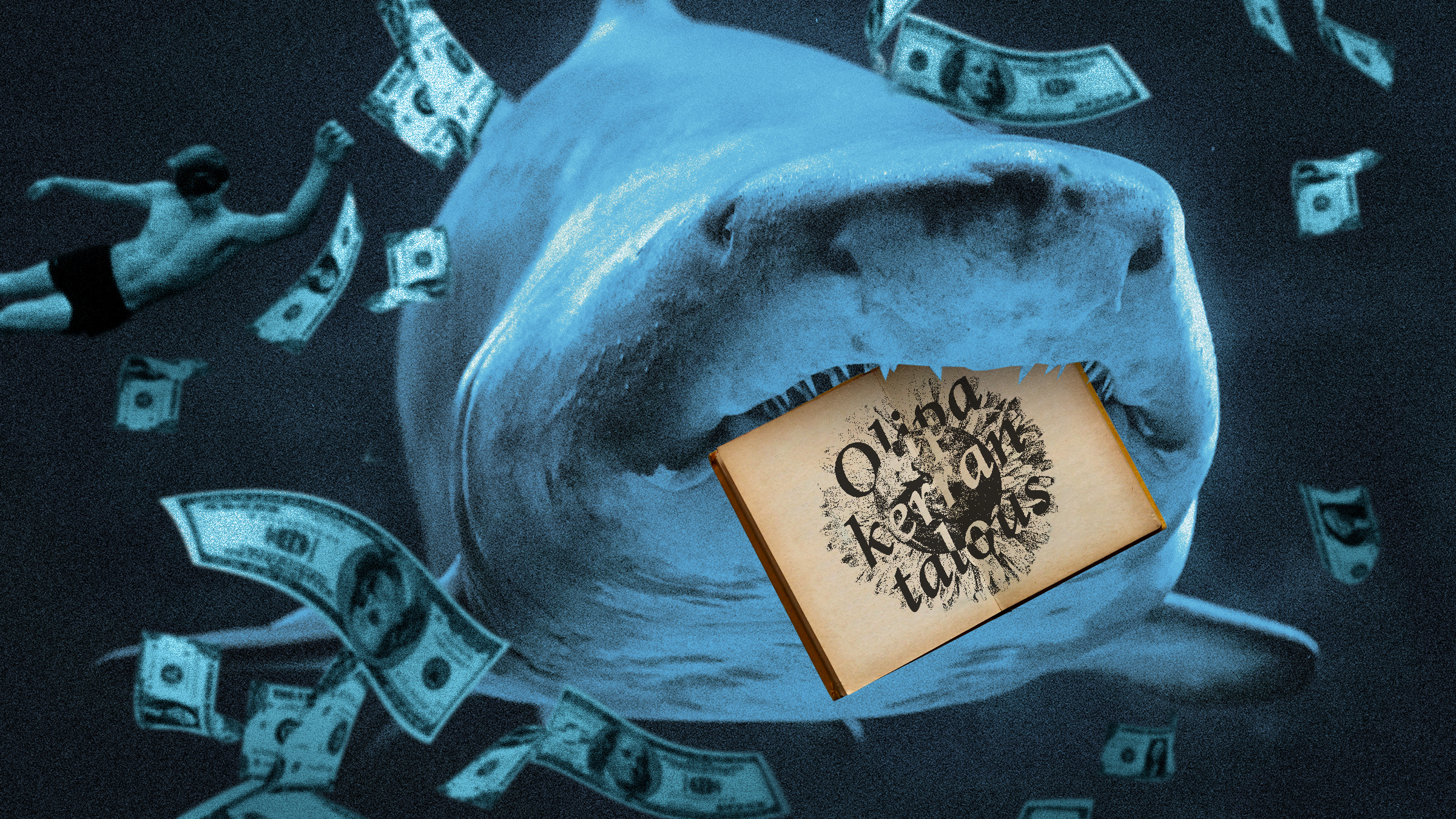
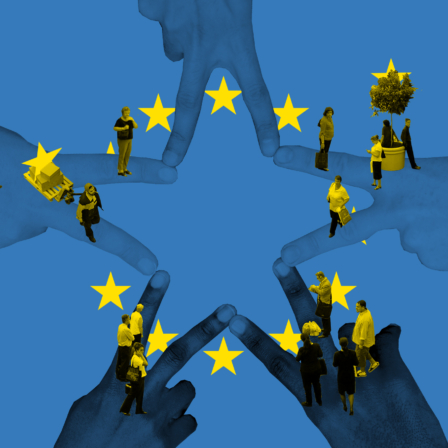


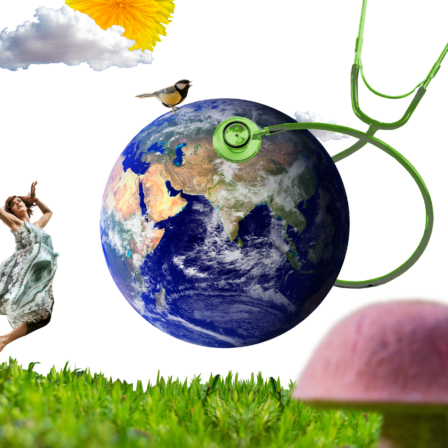
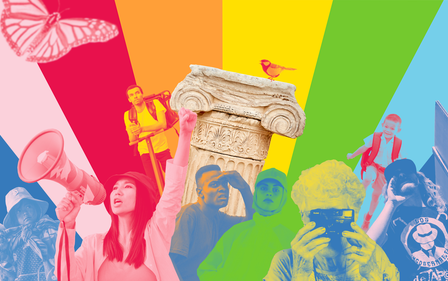

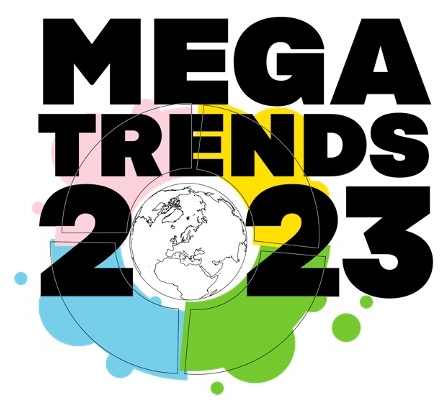
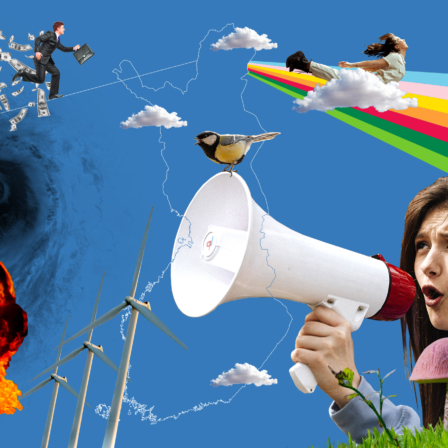
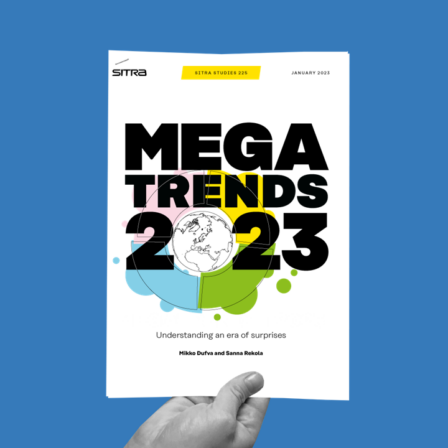

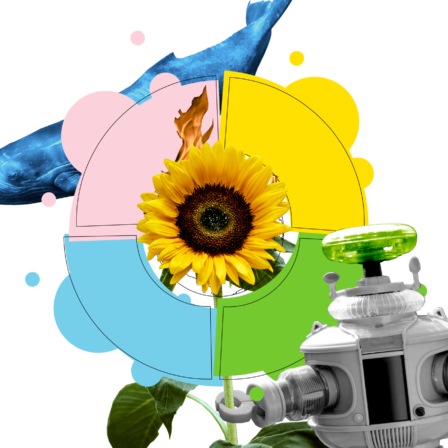
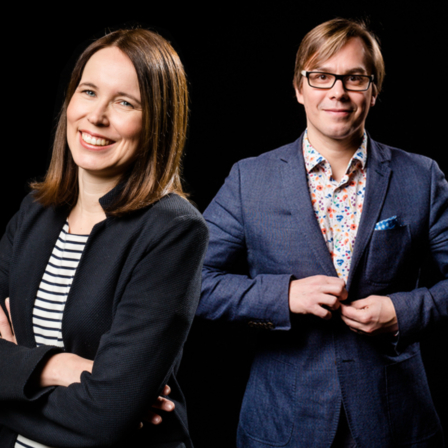



Recommended
Have some more.